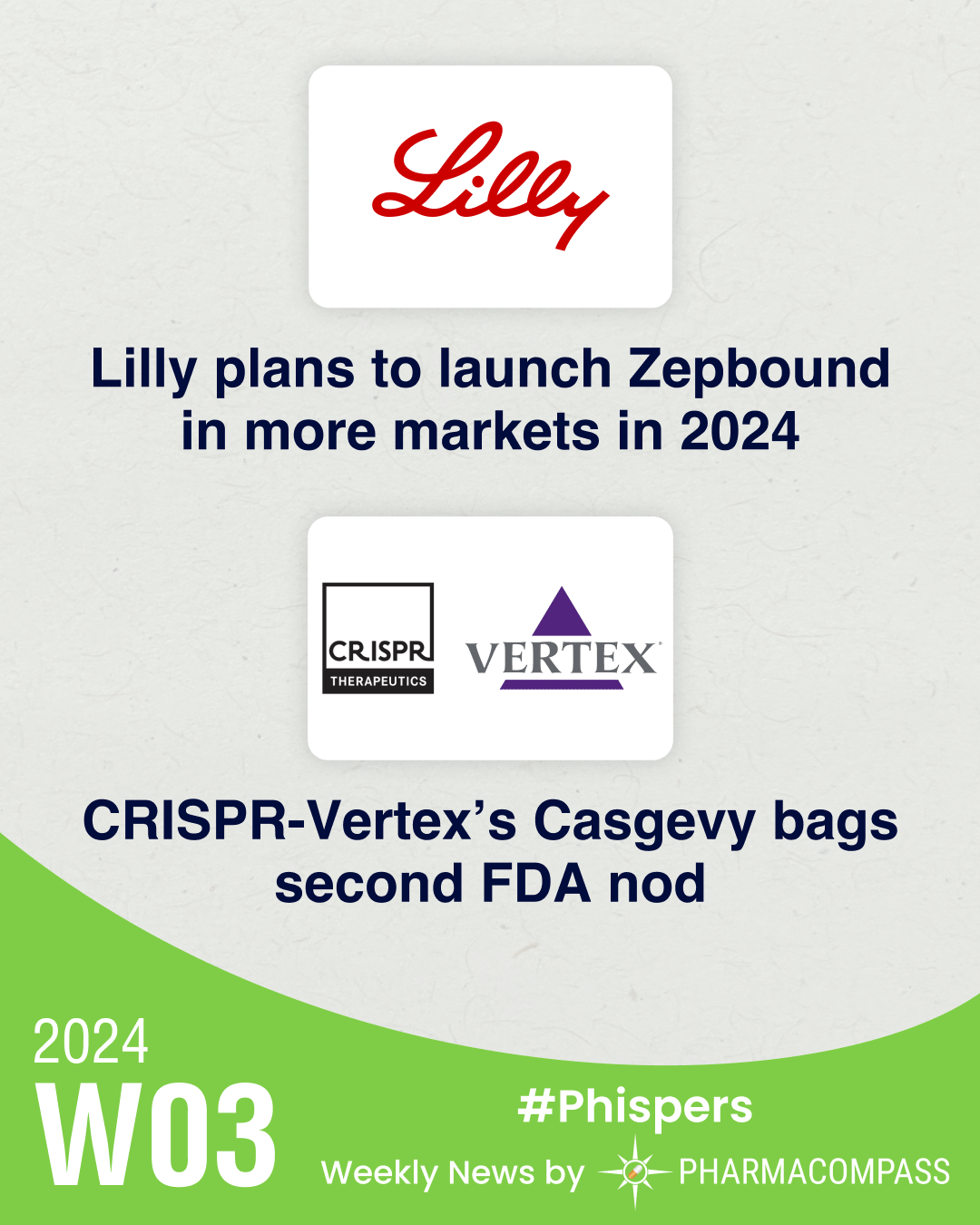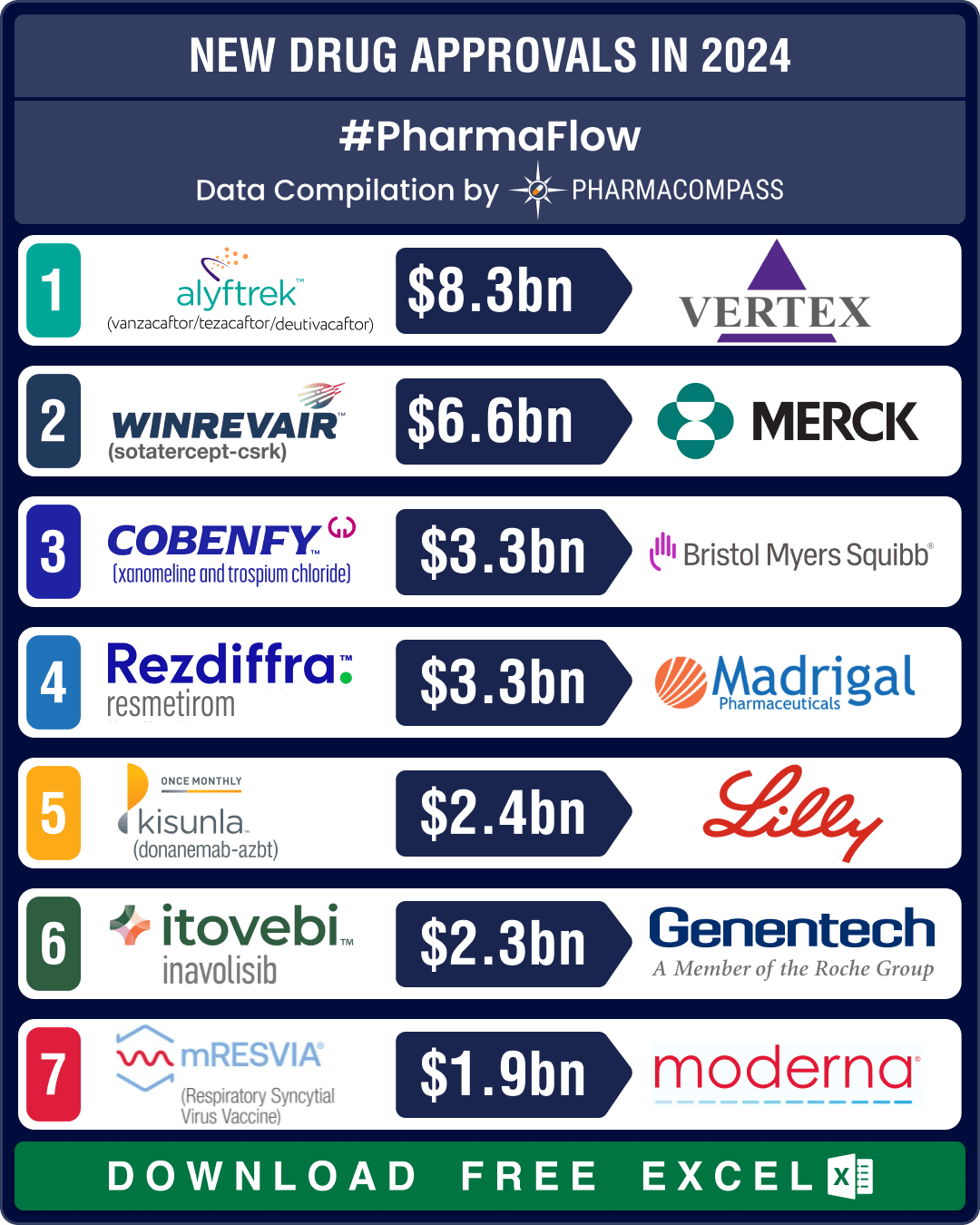
By PharmaCompass
2024-01-18
Impressions: 1246
This week’s Phispers brings you news from the annual World Economic Forum in Davos (Switzerland) where some senior executives of pharmaceutical companies discussed their growth plans for 2024. A top Eli Lilly executive said the company plans to launch Zepbound in several countries this year, and is “optimistic” about the pen injector gaining European approval by mid-2024. And, chairman of Dr. Reddy’s Laboratories said the company is planning to scale up its reliance on artificial intelligence (AI) to drive innovation.
The US Food and Drug Administration (FDA) expanded the indications of three important drugs. Less than a month after CRISPR-Vertex’s Casgevy saw its first FDA approval for sickle cell disease, the agency approved it for β-thalassemia, another inherited rare blood disorder. The approval comes two months ahead of its Prescription Drug User Fee Act (PDUFA) date of March 30. Similarly, Takeda’s HyQvia has won a second approval for a rare nerve disorder and Merck’s Keytruda continues to score expanded approvals, this time for a type of advanced cervical cancer (when used in combination with chemotherapy).
In deals-related news, there were reports that Novartis is no longer the frontrunner for acquiring Cytokinetics, and has possibly been replaced by Amgen. And, after spinning off Haleon in February 2022, GSK managed to raise an additional US$ 1.24 billion this week by selling more of its stake in this consumer health business.
Lilly plans to launch weight loss drug Zepbound in new markets this year
Speaking at Davos 2024, Ilya Yuffa, president of Lilly International, told Reuters that the company plans to launch its weight-loss drug Zepbound (tirzepatide) in new countries this year. The company is already working on expanding the manufacturing capacity for its diabetes and weight loss drugs.
Zepbound saw approvals in the UK, US, and Europe in the last quarter of 2023. While it has been launched in the US market, individual countries in Europe have a say in whether it is okay for their populations.
The Indianapolis-based drugmaker, however, is “optimistic” that Zepbound’s pen injector will win European approval in the first half of 2024. As of now, its vials have been approved. After launching its direct-to-customer website — Lilly Direct — in the US in January, Lilly is weighing a direct-to-patient model for individual European markets based on the regulations in each country.
Dr. Reddy’s banks on AI to drive innovation: Davos 2024 also saw Dr. Reddy’s Laboratories’ Co-Chairman and Managing Director GV Prasad talk about how the Indian drugmaker is leveraging AI to scale up research and development. He said the company is using “machine learning to understand how scale ups are done,” making its R&D a lot more productive. It’s also being used to gauge how “products will behave in the patient.”
The company is looking at AI not just for productivity but also to drive innovation by reducing the amount of experimentation, and to bring about more precision. He said Internet of Things (IoT) has become an integral part of the generic company’s operations.
CRISPR-Vertex’s Casgevy bags second FDA approval for genetic blood disorder
Vertex Pharmaceuticals and CRISPR Therapeutics’ Casgevy has bagged a second FDA approval, this time for transfusion-dependent β-thalassemia (TDT), a rare genetic blood disorder that routinely requires blood transfusions. The approval, which applies to patients over the age of 12 years, comes over two months prior to its PDUFA date of March 30. Analysts estimate peak sales of Casgevy for both indications — β-thalassemia and sickle cell disease — to be around US$ 400 million.
Takeda’s HyQvia wins second approval for rare nerve disorder: While Casgevy bagged a second FDA approval in two months, it took Takeda’s HyQvia ten years to bag another approval from the agency. A decade back, HyQvia (immune globulin infusion 10% with recombinant human hyaluronidase) was approved as a treatment for primary immunodeficiency in adults. And this week, it was okayed as a maintenance therapy for chronic inflammatory demyelinating polyneuropathy (CIDP) to prevent the relapse of neuromuscular disability and impairment in adults. CIDP is rare autoimmune disorder wherein the body attacks the fatty coverings that insulate and protect the nerves. Importantly, this subcutaneous infusion therapy requires just one dose a month. With the right training, it can be self-administered, the company said.
Keytruda granted expanded approval for cervical cancer: One drug that’s no stranger to getting FDA’s expanded use approvals is Merck’s blockbuster immunotherapy Keytruda, which now has no fewer than 39 approvals in the US. Now, Keytruda (pembrolizumab) administered in combination with chemoradiotherapy has been approved for newly diagnosed patients with a certain kind of advanced cervical cancer, making it the first anti-PD-1-based immunotherapy combination for patients with FIGO 2014 Stage III-IVA cervical cancer.
Novartis drops pursuit of Cytokinetics, Amgen maybe new frontrunner, say reports
Last week, there was news that Novartis was in talks to acquire Cytokinetics for well over US$ 10 billion after its experimental heart disease drug — aficamten — pulled off quite a performance and met its main goal in a late-stage trial. This potentially pits aficamten against Bristol Myers Squibb’s Camzyos (mavacamten).
But this week, Wall Street Journal has reported that Novartis has backed away from the deal.
However, the San Francisco-based biopharma is not short of suitors. According to a report published in Seeking Alpha, the new frontrunner maybe Amgen.
GSK sells off another stake in Haleon, raises US$ 1.24 billion
GSK has raised £ 978 million ($US 1.24 billion) by selling off more stake in Haleon, the biggest consumer healthcare business in the world with brands like Panadol, Advil and Sensodyne. The British drugmaker offloaded 300 million shares at a discounted price, reducing its stake in Haleon to 4.2 percent. It had originally retained 12.9 percent in Haleon. This is the third time in under a year that GSK has sold a stake in this business.
The PharmaCompass Newsletter – Sign Up, Stay Ahead
Feedback, help us to improve. Click here
Image Credit : Phisper Infographic by PharmaCompass license under CC BY 2.0
“ The article is based on the information available in public and which the author believes to be true. The author is not disseminating any information, which the author believes or knows, is confidential or in conflict with the privacy of any person. The views expressed or information supplied through this article is mere opinion and observation of the author. The author does not intend to defame, insult or, cause loss or damage to anyone, in any manner, through this article.”








